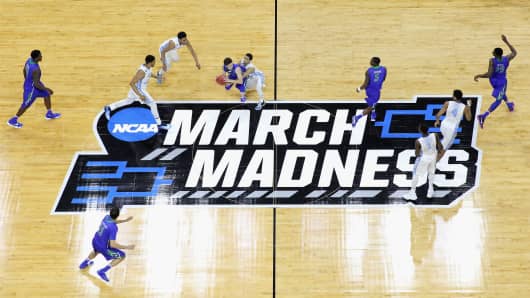The NCAA's media rights deal with CBS and Turner to air college basketball's March Madness is certainly not a television-only deal, with so many new media platforms being used to deliver games to fans.
But tell that to the actual announcers who've been calling these games for years and years. Many of them are sticking with their true love, television, and letting a younger generation deal with all the new whiz-bang tech. CNBC sat down with many of them at a recent event featuring network executives and on-air talent.
"You haven't researched me I can tell, I mean, I am limited in that area," said game announcer Bill Raftery when asked his thoughts about balancing old traditional media with newer platforms. Raftery coached college basketball into the 1980s and has been a CBS announcer for more than 30 years.
When asked how he deals with all the change coming to the media business, Raftery's announcing partner Verne Lundquist responded, "I don't, I'm an old-fashioned guy, it's too late to change." Lundquist, now in his mid-70s, has been broadcasting sports in some form since the 1960s. When asked if he's ever watched a game on his phone, he said: "No, too small. I don't have a Twitter account, I don't use Facebook. I do have semaphore code, I can do Morse code."
Lundquist also made a good point about the ways that the broadcast isn't changing. He said producers haven't told him to change his approach for a small-screen audience. "Never, it's not happened yet. It might and if it does I'm welcome to that. I do get the social changes and the technological changes, it's just we've not gotten to that point."
His announcing and production team have been using the same approach before anybody ever heard of Twitter or Snapchat. "When we do our telecast in the tournament or regular season, it's done the way it's been done for 20 years."
But it's not just the wise elders of the business who feel this way. "I'm old school, I like watching games on TV," said Wally Szczerbiak, a 40-year-old who played in the NBA through 2009. "How can you not want to watch your game on a 55-, 65-, 75-inch high-definition TV? That's the way sports was meant to be watched"




